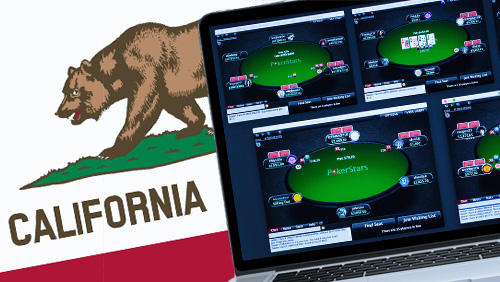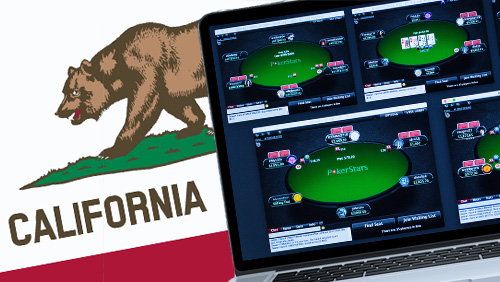The likelihood of a bill to legalise online poker in California by the end of the year looks remote after a coalition led by PokerStars, the Poker Players Alliance, and two influential tribes oppose AB.2863 after Adam Gray included a last minute amendment to ban PokerStars for five years.
 Once upon a time (before 2006), there was a thriving online poker business in the United States of America. At that point, partypoker was the largest online poker room in the world. Parent company PartyGaming had a market value of over $8 billion.
Once upon a time (before 2006), there was a thriving online poker business in the United States of America. At that point, partypoker was the largest online poker room in the world. Parent company PartyGaming had a market value of over $8 billion.
Then came the 2006 Unlawful Internet Gambling Enforcement Act (UIGEA). Attached to the SAFE Port Act, this document prohibited gambling enterprises from accepting wagers that involved the Internet. Partypoker took the hint, packed up their suitcase and left the States. PokerStars did not.
More knowledgeable people than me are currently arguing that PokerStars’ decision to offer US citizens an online poker room, when the rest of the online poker rooms had buggered off because of the UIGEA, is the primary reason they now dominate 70% of the global online poker market.
It’s a likelihood that’s pissed a lot of a lot of people, namely competitors who have, or will suffer as a result of the leverage PokerStars applied to mop up the player base of one of the most strategic and mass filled online poker communities in the world.
A decade later and a sense of normality is starting to resume in America. Regulated and licensed online poker markets exist in Nevada, New Jersey, and Delaware. PokerStars operate in New Jersey; they ignore the two people who live in Delaware, and the Nevada Gaming Control Board (NGCB) handed out a five-year ban to PokerStars for continuing to offer online poker post-2006.
California and The Bad Actor
Nevada is a hotbed of gambling activity. It is the home of the World Series of Poker (WSOP) and therefore has a special place in the ventricles of the poker community.
2.8 million people live in Nevada.
38.8 million live in California.
For a long time, California was the favourite to become the fourth state to legalise online poker. That situation is currently falling apart at the seams and who will ultimately feel the pain?
The players will.
Essentially, there are three warring factions at play, with one of them currently on the sidelines. Sitting out the California struggle is Sheldon Adelson and the Coalition to Stop Internet Gambling (CSIG). The man who made gazillions of dollars selling gambling products to people believes online gambling is a ‘cancer.’ He has vowed to do everything in his power (use his billions of dollars), to blot online gaming from the landscape so he can continue to take that revenue share, even though he has billions, and will likely die in the next 10-years.
That leaves the enterprises who want online poker in California but are currently acting like the girls and boys in a youth club disco. In one corner of the dance floor, you have 10 Indian Tribes who believe PokerStars should pay its pound of flesh for staying in the US market post-2006. On the other side, you have another coalition, led by PokerStars, who would prefer to offer up a few nail clippings rather than the painful flesh thing.
Neither side ever met in the middle for a smooch, but relationships seemed to have strengthened over the past few years, with both sides seemingly acknowledging a need for a win-win approach with the bill creator Adam Gray dancing solo in the middle.
All that changed on Thursday after Gray allowed last minute changes to creep into AB.2863 that would delay PokerStars involvement in the California online poker market for five years. It’s widely believed Gray’s decision was a move of sheer desperation to try and squeeze legislation in by the end of the year.
Over the weekend, PokerStars and their buddies, including the Poker Players Alliance (PPA), have informed anyone who wants to listen to vote NO when the bill drops into Assembly on Monday. Yes, you heard me right, the faction who so desperately fights for a fully regulated online poker network in California, doesn’t want one if there is a bad actor clause prohibiting PokerStars from playing with the ball.
In addition to the PokerStars Coalition and the PPA urging lawmakers to drop the bill, the Viejas Band of Kumeyaay Indians and the Lytton Band of Pomo Indians are also opposing the bill because they believe the current wording of the ‘bad actor’ clause allows PokerStars to play legal fudge and reduce their five-year sin bin.
The text currently states the PokerStars ban would end in 2022. The two tribes want the five-year ban to begin when the first hand of legal online poker is dealt in the state to reduce the likelihood of jiggery-pokery by Stars. And if a ban of five years isn’t enough of a kick in the bollocks, the two tribes also want a rather expensive punishment thrown into the mix worth many millions of dollars.
An excellent piece written for the OnlinePokerReport by Dave Palermo suggests the latest move by the two tribes may see Gray pull the bill away from a potential vote on Monday.
It’s a mess, and the only loser in all of this is the poker player. The stench of bullshit that’s coming from these coalitions is unbearable. Each move they make in this game of poker chess is said to be for the players, and yet it’s the players who suffer.
Former Team PokerStars Pro, Isaac Haxton, opened up a poll on his Twitter account to see whether people would like a California iPoker market minus PokerStars or to wait until PokerStars can get involved? 788 people voted and 73% would prefer an iPoker market in California minus PokerStars rather than wait for their inclusion.
The current argument is not about players rights.
Nobody cares about underage gambling and the use of unregulated sites.
It’s all about greed.
Nothing more.
Nothing less.
The bill needs a 2/3rds vote to get out of the Assembly. Monday is the big day. Sources obtained by all the leading media sites believe the bill will not move one inch.
We will keep you updated as news comes in.
